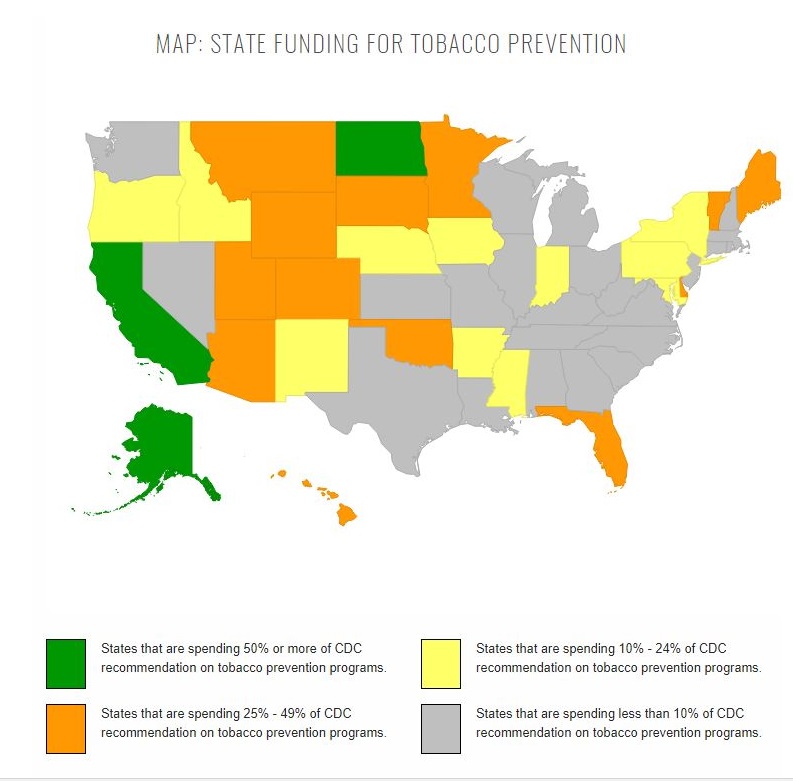
PROVIDENCE — Rhode Island ranked No. 40 nationwide in funding tobacco use prevention and quitting programs, and will spend less than one percent of this year’s combined revenue from the 1998 tobacco settlement and tobacco taxes on such programs, according to a report released Wednesday by the Campaign for Tobacco-Free Kids.
The rankings were based on state spending on tobacco prevention and cessation programs as a percentage of Centers for Disease Control and Prevention recommended funding for each state.
Rhode Island is spending $375,622 this year on tobacco prevention and cessation programs, 2.9 percent of the $12.8 million recommended by the Centers for Disease Control and Prevention, according to the report.
John Schachter, director of State Communications Campaign for Tobacco-Free Kids, said the organization verifies the numbers with the state and then confirms with both a local tobacco control advocate and staff at the State tobacco control program in the Department of Health. Joseph Wendelken, public information officer for the R.I. Department of Health, confirmed $375,622 has been allocated to the tobacco control program this year.
The R.I. Department of Health states on its website that the CDC recommends funding levels between $10 and $22 million to conduct an effective program.
“The numbers speak for themselves: tobacco companies spend $26 million each year to market their deadly and addictive products here in Rhode Island – more than 69 times what the state spends on tobacco prevention. In order to combat this, it is imperative that lawmakers commit to increased funding for the state’s tobacco control program,” said Robert Dulski, director of government relations for American Cancer Society Cancer Action Network, Inc. in Rhode Island.
The report, “Broken Promises to Our Children: A State-by-State Look at the 1998 Tobacco Settlement 19 Years Later,” reports Rhode Island will collect $195.5 million in revenue this year from the 1998 tobacco settlement and tobacco taxes combined (Truthinitiative.org reports the state will collect an estimated $194.4 million in tobacco settlement payments and taxes in 2017), but will spend only 0.2 percent of that money on tobacco prevention programs.
Robert Dulski, director of government relations for American Cancer Society Cancer Action Network, Inc. in Rhode Island, said the amount of taxes from tobacco sales this year will be about $140 million.
In Rhode Island, 4.8 percent of high school students smoke, and 300 kids become regular smokers each year. Tobacco use claims 1,800 Rhode Island lives and costs the state $640 million in health care bills annually.
Wendelken, said the department’s commitment to tobacco prevention is steady regardless of funding.
“There is a tremendously dedicated group of anti-tobacco advocates in Rhode Island, and youth advocates in particular. Their work has helped our state have one of the lowest rates of light cigarette smoking rates in the nation. We are now turning much of our focus to e-cigarettes and other emerging tobacco products, with the aim of eliminating tobacco consumption in any form in Rhode Island. This commitment is steady, no matter the amount of funding we receive for tobacco prevention work from one year to the next,” Wendleken said.
Nationwide, states will collect $27.5 billion this year from the tobacco settlement and tobacco taxes, and will spend less than 3 percent of it, $721.6 million, on tobacco prevention programs, according to the report.
In 2015, according to the Kaiser Family Foundation, Rhode Island received $45 million from the settlement. The state has received $768 million from the settlement between 1999 and 2015.
Rhode Island’s high cigarette tax ($4.25 per pack) and strong, statewide smoke-free workplace law have helped drive the high school smoking rate down to 4.8 percent, one of the lowest in the country. To continue the progress, health advocates are urging Rhode Island leaders to increase funding for its tobacco prevention programs and to raise the legal sale age of tobacco products to 21.
“Rhode Island has made significant progress in reducing tobacco use and can achieve even more by increasing its investment in programs to prevent kids from smoking and help smokers quit,” said Matthew L. Myers, president of the Campaign for Tobacco-Free Kids. “We can win the fight against tobacco and make the next generation tobacco-free, but Rhode Island needs to continue doing its part to help achieve these goals. Raising the state’s tobacco age to 21 would be an excellent step forward.”
Rob Borkowski is a PBN staff writer. Email him at Borkowski@PBN.com.











